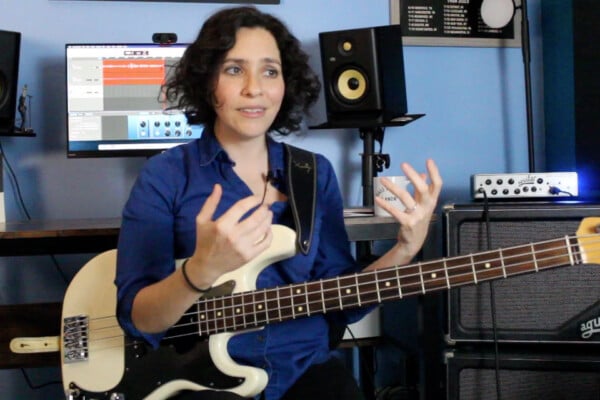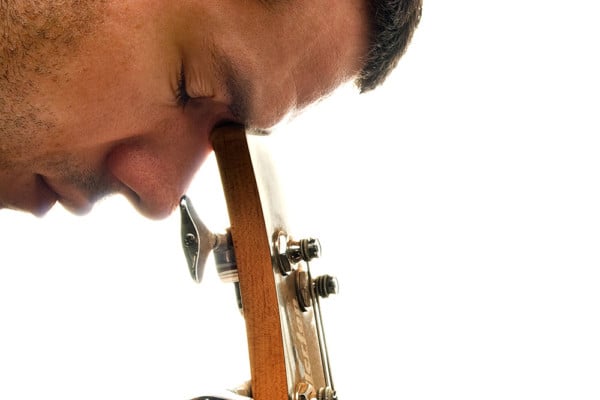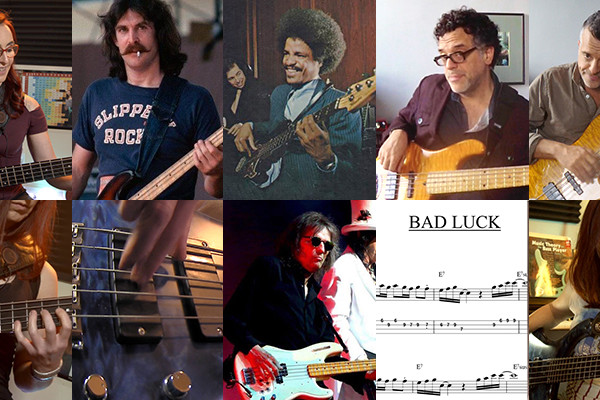Learning the Bass: Should I Get a Teacher?

Q: I am a beginning bassist. I want to know your opinion about studying bass with a teacher vs. self-teaching. Which do you think is more useful and advantageous? I’ve studied with a teacher since last year, but I don’t find I’m progressing anymore, and I’m in doubt if I should continue with the same teacher. I feel like I lose time and money. Please help. Thank you!
A: I always suggest that people work with a teacher or a variety of teachers.
The most obvious thing to point out is this: you don’t yet know what you don’t know (especially as a beginner).
A good teacher should be able to spot any holes in your foundation and help to patch them up. In addition, they should be able to help lay out a clear path towards development. He should be giving you exercises and assignments which challenge (but don’t confuse) as well as giving you an idea of how this step will lead to the next, and so on.
If you feel that you might not be with the right teacher, continue to seek out new instructors. As a beginning student, you will definitely want to have a teacher that can lead you on the path to good technique and bass line creation but, as you progress, you might even seek out other instrumentalists to instruct you on more general concepts about musicality, improvisation, styles, etc… A good teacher is worth their weight in gold and bad teacher is just a waste of time and money, like you said. Find someone who inspires you. You should leave each lesson feeling like you better understand something and excited to take the next step.
That said, plenty of people are self-taught. There is no “one” way to do it but you have to make sure to keep challenging yourself if you do it yourself. Focus on transcription, learning tunes by ear, feel, tone and time. Work hard an maintain a daily practice routine.
The hardest part about teaching yourself is two-fold, in my mind:
- Discipline. It’s hard to force yourself to push harder and harder when you don’t have specific exercises or pieces of music that you have to have ready by next week. Make sure to set goals for yourself and stick to them. Don’t hang for too long in your comfort zone.
- Unknown deficiencies. There are plenty of things that we haven’t thought of and only discover by virtue of having other perspectives to guide us. A good teacher is a direct path to those discoveries.
Learning and teaching is a two way street. Don’t just expect everything to be handed to you. Write any questions down and tell your teacher what you want from the instrument. Do you want to slap? Do you want to be a session player? Do you want to go to school (which usually means studying jazz or classical music). Help to guide them in their instruction. Get them talking about their experiences playing music and making a living off of music (if that’s a goal). Have a dialogue. You’ll learn much more that way.
One final thought. Have patience with the work. Much of what you learn (especially in the beginning) takes a while to really sink in. I have seen many students get frustrated because they didn’t become amazing players after a few years of study. There is no time line and no finish line. Everyone learns at a different pace as well. You will learn more if you simply focus on learning something new every day or better integrating something you are working on day by day. Have fun with the process and remain excited for every step taken. When you keep your head in the game, it will seem like time flew by and you might not even realize just how much you’ve learned until it dawns on you that “I wouldn’t have been able to do this last year” or “man, I thought these people were out of my league but they don’t sound quite as badass as they used to”.
Work hard and have fun. Take knowledge from every available avenue. In the end, it’s you that does the work so we are all partially self-taught in a way, but a guiding hand can be invaluable.
Have a question for Damian Erskine? Send it to [email protected]. Check out Damian’s instructional books, Right Hand Drive and The Improviser’s Path.




The question is not “teacher” or “self-taught.” You will always be teaching yourself–or you should be–via practice, learning songs, and making music with others. A good teacher will guide you on your own journey: answering questions, helping through difficult parts, advising on technique, exposing you to new ideas and approaches, and pushing you to do better. In the end, though, it’s all up to you. Nobody can teach you anything you don’t want to learn.
This is a wonderful article! I kind of lean forward this strategy too! On the other hand, you will probably start to learn A LOT when you are working with a band, or several bands. A teacher (or an online lesson or video) can instruct you, tell you what to do, but in a band, you are the only one playing the bass, and sticking the whole band together.
No matter how much I’ve learned by my teachers or online, always overplayed my lines, stuffed them with unnecessary licks, flashy stuff wich eventually made us sound less stable. This eventually ended when I’ve started to really pay attention to the instrument, realizing wat it’s soul purpose is.
What I’m trying to say here is that classes and you practicing in your room is one thing (a good one), but starting to play with others is a whole new world. You will start the pay attention to others as well, especially to the drummers. You will learn a lot simply by just playing with people more experienced than you. This can sometimes also prove to be a challenge, but once you get the hang of it, you will actaully learn a lot of stuff (like dinamics, locking up with the drumms, developing a better sense of groove) without even realizing it.
Hope this stuff helps, I kind of tend to wander away… :)
i would like to add that when I was new to the instrument some 40 odd years ago I lived in a small tourist town in the South island of new Zealand. It was impossible to find a teacher so I had do do all the hard work by my self. and up until the last five years I played mostly by ear with some chart reading skills.I then decided that as I had hit the brick wall that comes with ignorance, that I had to do some thing about it. Musicians today can count them selves lucky that they climb on the shoulders of those who have pioneered the instrument.There is so much great information out there now that beginners should really take advantage of the tools available to them. I have never had a teacher but at the ripe old age of 73 I am studying an online course on improvisation. This has lifted my playing level more that any thing that I could have worked out on my own.
I now teach students who really want to learn and use Jeff Berlins advice which is not to ask the student what he wants to learn today, but rather endeavour to teach him real musical information. This he can only really get from a dedicated and forward thinking teacher.
Good suggestions and advise.When given an opportunity to learn something new, or a way to improve upon what you alread know …. Go for it! Watch,listen,practice,play?? BASS ON !
I had a teacher with lessons every week for three years. After that i had no teacher for another two years. Since then, till now, i take lessons once one ore two month with a great teacher. This took me further musically as well as versatility than the years with a regular teacher. But most i learned by just playing in bands. Play as much as you can with other musicians and develop your groove. Theory comes with the time.
Having played over 25 years, I’m glad that my teacher admits easily that I can play, and it’s helpful that I get work to further develop my playing. To steal from the film, “Chariots of Fire”, I felt that to get closer to where I wanted to be i needed “someone to help me” get where I want to go.
Seek out teachers and musical situations in which you can learn and grow. The ultimate goal is sounding more like you than anyone else.